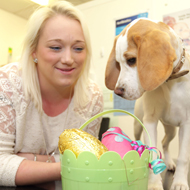
PDSA braced for Easter poisoning cases
Just under half a million dogs in the UK are still being fed chocolate, despite the fact that it could be life-threatening, according to figures released by the PDSA as it prepares for a hike in poisoned pets this Easter.
Five per cent of dogs - equating to nearly 500,000 pets - have been fed human chocolate, according to the charity's latest Animal Wellbeing Report.
Charity vet Vicki Larkham-Jones said: "At Easter and Christmas our vets are on standby for a rise in cases of chocolate poisoning, which in some cases can be very serious and sometimes even fatal.
"Most pet owners love giving their pet a treat but some are still unaware of the dangers of human chocolate. Easter should be a time of celebration but making a simple mistake through lack of awareness could actually mean the difference between life and death for your pet."
One case saw beagle puppy Jessie brought to a PDSA centre in Croydon after she wolfed down three chocolate eggs and their foil wrappers. The seven-month-old's owner Justine Parsons said she came home to find the pup had gone into her daughter's bedroom and climbed onto a desk to get at the eggs.
Veterinary nurse Rachel Beedle commented: "Although milk chocolate has lower levels of theobromine than dark chocolate, Jessie had eaten a large amount; which could have proved fatal."
Justine said that while she realised chocolate wasn't good for dogs, she had no idea how toxic it was.
As most of the chocolate was still in Jessie's stomach, she was given medication to make her sick, along with activated charcoal to prevent further absorption of the toxins. Fortunately she responded well to the treatment and was able to go home the same day.
Rachel added: "Jessie made a full recovery and there was no lasting damage from her ordeal. But vets see hundreds of cases of chocolate poisoning a year and, sadly, not all have a happy ending."
The charity is urging pet owners to store chocolate in the same way as medicines - safely and securely out of reach.
Image © PDSA



 The Veterinary Medicines Directorate (VMD) is inviting applications from veterinary students to attend a one-week extramural studies (EMS) placement in July 2026.
The Veterinary Medicines Directorate (VMD) is inviting applications from veterinary students to attend a one-week extramural studies (EMS) placement in July 2026.